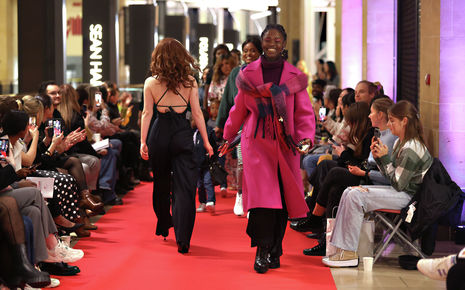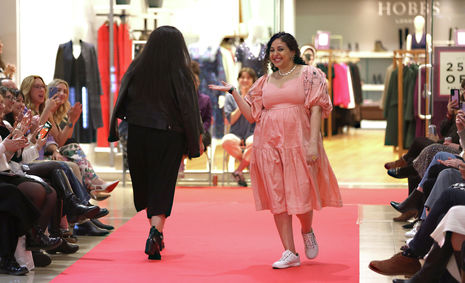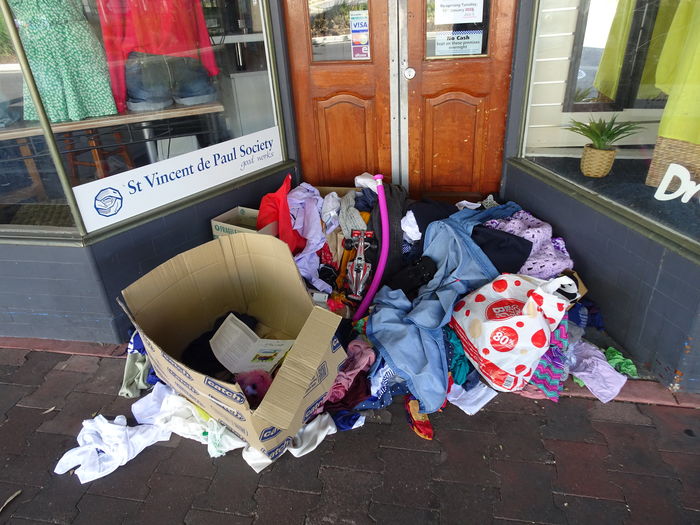The Good Fashion Show at the Grand Arcade
Social enterprise Give Your Best supports refugees through fashion

The sterile walkways of the upper floors of the Grand Arcade were transformed into a red carpet catwalk for the night last week. As part of the ‘Let’s Go Circular’ initiative the shopping centre has been hosting over the past weeks, the Good Fashion Show celebrated the work of the volunteer-run charity, Give Your Best which aims to “celebrate the power of fashion as a force for good.”
Give Your Best is a ‘tech for good’ social enterprise founded by Sol Escobar amidst the second COVID lockdown in 2020. Initially just an instagram page, the concept behind the platform is that individuals and brands can donate old clothes from which refugee women and children can ‘shop’ for free. A spin on the traditional charity shop, Give Your Best is based on the idea that by giving people choice over what they want to wear they can gain back a sense of individuality and dignity. Described by Sol as a “Depop for donations,” this platform suggests that freely choosing what we wear, can provide us with a sense of self and belonging.
"Freely choosing what we wear, can provide us with a sense of self and belonging"
This year’s fashion show aimed to celebrate the refugees that Give Your Best works with. Women and children from Nigeria, Ukraine, Pakistan, Albania and beyond walked the catwalk. Giving refugee women the chance to take part in the show themselves embodied the ethos of Give Your Best to centre their clients choices and personal expression. As Sol emphasised, we live in a world full of ”negative rhetoric about refugees” and showcasing the stylistic creativity of these women is a way the charity tries to challenge faceless representations of asylum seekers. As I spoke to one of the models who had taken part in the show, Sidorella from Albania, she described how much the opportunity had meant to her. “I feel like I’m walking on air!” she exclaimed.

The outfits for the night were put together from clothes that participating brands had gifted to the event. High street names such as Hobbs, John Lewis and Doc Martens all took part alongside donations from pre-loved and sustainable brands. Working with the limited selection of items donated by brands meant that a lot of the looks were relatively simple and unadorned. While the outfits were definitely more appropriate for everyday wear than anything you’d see at Fashion Week, bright colours, interesting patterns and bold statement pieces all left an impression. Some of the most original items came from brands you wouldn’t typically find on the highstreet like In Our Name, a Kenyan brand focused on producing sustainable and socially responsible clothing and accessories.
"The Good Fashion Show demonstrates the potential of stylistic creativity to go hand in hand with promoting social good"
The Good Fashion Show demonstrates the potential of stylistic creativity to go hand in hand with promoting social good. Along with providing women and children in vulnerable circumstances with the opportunity to empower themselves through fashion, their program of clothes donation acts as a way to reduce clothes waste. Of course it’s hard to gloss over the fact many of the big brands that donate to Give Your Best are far from sustainable in their own business practices, but on a small scale this program of peer-to-peer donation gives items of clothing a new breath of life.
Although perhaps more of a fundraiser than a runway event, the Grand Arcade’s charity fashion show ended up doing much more than just raising money for a worthy cause. A night of celebration of displaced people around the world, The Good Fashion Show made it clear that for people of all backgrounds, clothing can have the power to change lives. The next morning, of course, the grand arcade returns to its regular business of selling clothes en masse, for profit. As events like The Good Fashion Show recognise the importance of more socially responsible modes of consumption, this provides the opportunity to reflect on what tangible, permanent change in the fashion industry could look like.
 News / Caius mourns its tree-mendous loss23 December 2025
News / Caius mourns its tree-mendous loss23 December 2025 Comment / Yes, I’m brown – but I have more important things to say22 December 2025
Comment / Yes, I’m brown – but I have more important things to say22 December 2025 News / Cambridge welcomes UK rejoining the Erasmus scheme20 December 2025
News / Cambridge welcomes UK rejoining the Erasmus scheme20 December 2025 News / CUP announces funding scheme for under-represented academics19 December 2025
News / CUP announces funding scheme for under-represented academics19 December 2025 Interviews / Politics, your own way: Tilly Middlehurst on speaking out21 December 2025
Interviews / Politics, your own way: Tilly Middlehurst on speaking out21 December 2025










